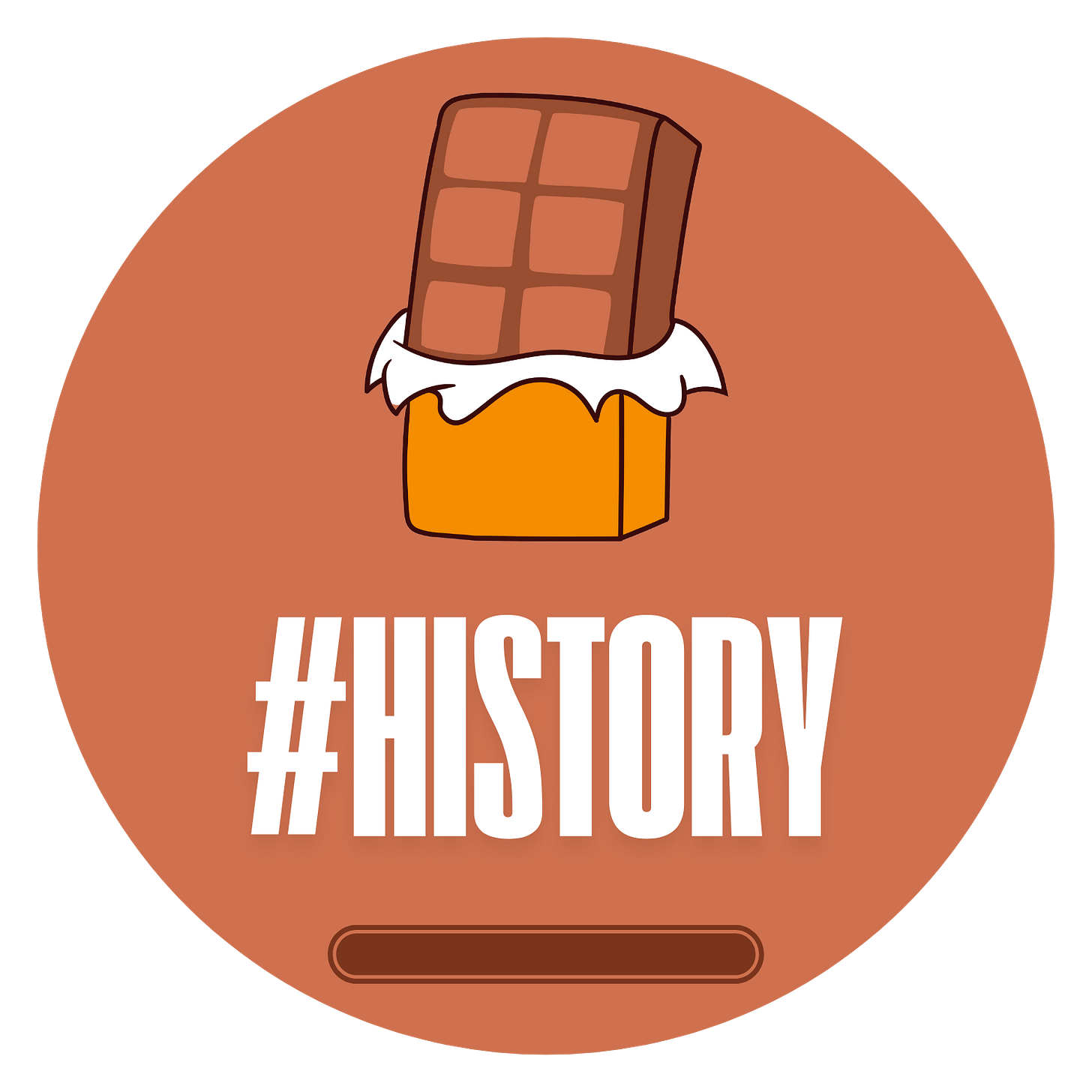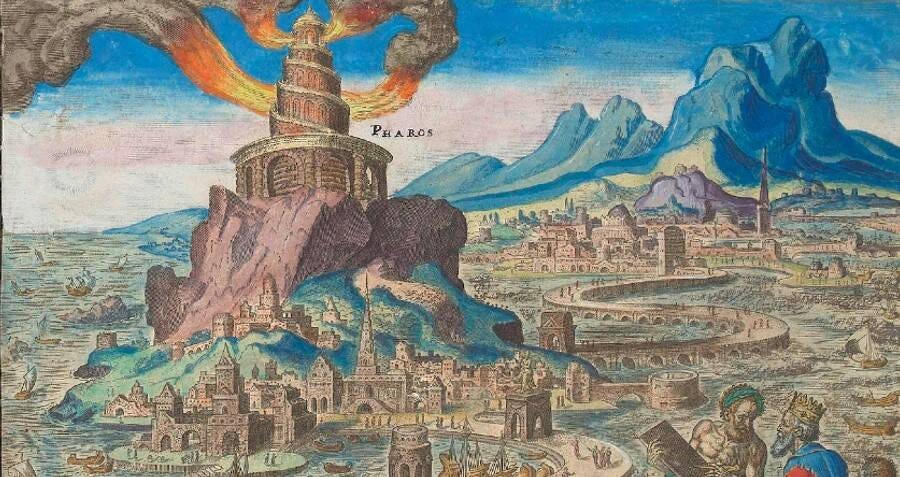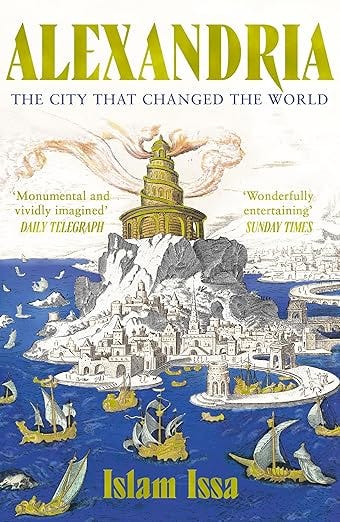7 Things You Didn't Know About Alexandria
On This Day, Quotes, Barack Obama, and Word of the Week.
BOC#031
5 MINUTE MUNCH
TITLE PIECE: ALEXANDRIA, EGYPT
Alexander the great established several cities, the most famous of which was of course the Egyptian metropolis of Alexandria. Just eight years after laying the cities foundations, Alexander died in Babylon at the young age of thirty-two. While he founded Alexandria, it was in fact Ptolemy I Soter who transformed it into the centre of commerce and culture it went on to become. Here are seven things you probably didn’t know about this great Egyptian city.
1. RAQOTE BECOMES ALEXANDRIA
Sometime before the creation of Alexandria the locals referred to the area as Raqote (or Rhacotis). The name Alexandria certainly didn’t catch on immediately. Egyptians were reluctant to accept the new name as they thought it might erase their heritage and signify a shift in power and ownership. It would take a new generation and the arrival of non-Egyptians for the new name to be more widely accepted. The city was intended to be a megapolis to rival the likes of Athens and Carthage.
2. WITH WINDS IN MIND
In his writing, Aristotle discusses the principles of an ideal city inspired by Hippodamus of Miletus. One of the founding ideas he discusses is the Hippodamian grid system, and the angling of the roads in order to benefit from the sea breeze while simultaneously sheltering citizens from strong winds; both of which were employed during the building of Alexandria. These ideas were influenced by Alexander’s own architect and technical director, Deinocrates who was himself inspired by the Greek architect Hippodamus of Miletus a century earlier. The Alexandrian coast lay low, so by linking the Pharos lighthouse to the mainland they were able to create two large ports helping to shelter the city from the wind. Upon his arrival, Alexander connected the island of Pharos to the coast by building a causeway. The great lighthouse at Alexandria (the first of its kind and one of the wonders of the ancient world) stood as a beacon on the island and became known as Pharos.
3. BUDDHIST MISSIONARIES ARRIVE
Buddhist monks arrived in Alexandria as early as the third century BCE. Inscribed edicts from the time of the Indian emperor Ashoka (268 to 232 BCE) indicate that emissaries were sent to the Mediterranean with medicinal plants, naming Ptolemy II as the recipient. It is likely that these emissaries developed a religious community and even started families in Alexandria, becoming a part of the city’s early makeup.
4. CITIZENSHIP
Not everyone who lived in Alexandria was an ‘Alexandrian.’ As had once been the case in Athens, the benefits of being a ‘free citizen’ of Alexandria were substantial and followed Aristotle’s notion that a citizen isn’t just someone who administers the law and rules, but upholds the law and submits to rule. The Ptolemies permitted both men and women to be citizens. An Alexandrian paid less tax, was better protected, and sometimes received financial gifts from the government. They could also participate in the Olympic Games. To become a citizen, both a person’s mother and father had to have been Alexandrian citizens.
5. KOINE GREEK
Alexandrians communicated using an ‘Alexandrian’ dialect of Greek that came to be known as Koine Greek. The dialect is thought to have begun in Alexander’s armies and morphed as different Egyptian and Hebrew speakers tried to communicate in the new official language. Koine Greek went on to become the language of the Bible and spread to the Greek mainland in the post-classical period, when scholars like Plutarch used it.
6. THE GREAT BOOK RUSH
The written word was significant and considered to be divine in Egypt. In fact, in Egyptian, ‘writing’, or medu netjer, meant ‘god’s words’. The Ptolemaic translation of the term ‘hieroglyphics’, means ‘holy carvings’.
The Great Library of Alexandria was intended to be a Greek-language institution, although the books came from every known culture. Anyone entering or docking at the city ports had to hand their books over to the authorities for inspection. They were then rushed to the library where it was decided whether the book would be returned or confiscated. Copies of the confiscated books would often be returned with monetary compensation. On one occasion, Ptolemy III sought to borrow the Athenian tragedies of Aeschylus, Sophocles and Euripides from the Athenian governors. Having deposited gold and silver worth £300,000 by today’s standards, he took the liberty of keeping the originals, returning only copies. It is estimated that there were between 700,000 and a million books in the library by the first century BCE.
7. THE GREAT MINDS OF ALEXANDRIA
While we’re often taught that it was Copernicus who first came up with the heliocentric model of the solar system, it was in fact an Alexandrian by the name of Aristarchus of Samos who we discussed in BOC#003. The famous mathematician Euclid whose geometry we learn at school was an Alexandrian, as was the surgeon Zopyrus who invented an antidote to poison that he’d hoped to test on criminals. Other notable Alexandrians include Aristophanes who laid the foundations for the punctuation we use today, and Eratosthenes who calculated the Earth’s circumference and developed a calendar that would go on to inspire the Julian calendar. The Polymath Claudius Ptolemy, and Heron (or Hero) of Alexandria who invented a steam engine known as an aeolipile also deserve a notable mention.
Further reading: Check out Islam Issa’s incredible book below! 👇
DID YOU KNOW…
Kandahar, the Taliban capital in Afghanistan was originally called “Iskandar,” which is how “Alexander” was pronounced in the east. The “Is” dropped away, and “Kandar” became “Kandahar.
Egypt’s Alexandria is known as Iskandariya in Arabic.
ON THIS DAY: 4th AUGUST
Britain entered the First World War today in 1914, declaring war on the German Empire.
The Greenwich Foot Tunnel opened today in 1902. It crosses beneath the River Thames and connects Greenwich on the south bank with Millwall on the north bank.
The album Purple Rain, by singer-songwriter Prince, hit Number 1 on the Billboard 200 today in 1984, staying there for 24 weeks.
The British Red Cross formed today in 1870. It was the British National Society for Aid to the Sick and Wounded in War.
“Whenever I feel the need to exercise, I lie down until it goes away.” — Paul Terry
“I like work: it fascinates me. I can sit and look at it for hours.”
― Jerome K. Jerome
WORD OF THE WEEK: SYCOPHANTIC:
To be grovelling and flattering to someone with influence in an attempt to gain favour.
FROM THE AUTHORS MOUTH:
Barack Obama, the 44th President of the United States from 2009 to 2017, was born today in 1961.
Buy: Dreams From My Father, A Story of Race and Inheritance. (Affiliate)
MISSED LAST WEEK? Read Here: The Man Who Stole India
[Links marked with * are affiliate links]













I thought I knew a bit about Alexandria, but that was really interesting. It was a catastrophe when that library was destroyed.
Wow, didn't know the great library was partially built through confiscating books. Great article!